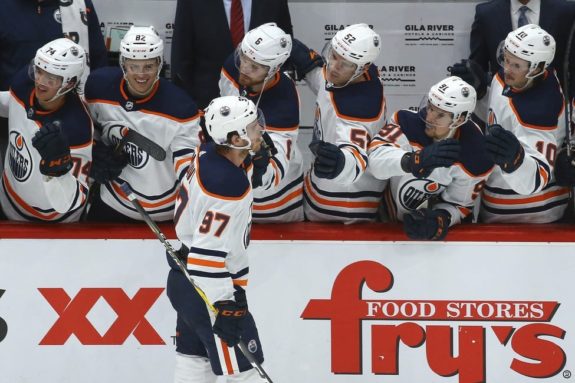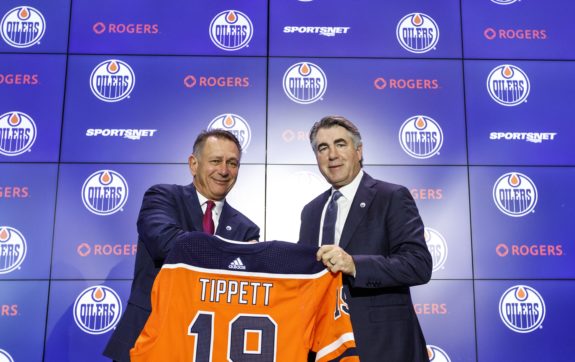No team in the NHL capitalized as frequently on the power play than the Edmonton Oilers did this past season. Likewise, no team in the league was as suffocating once they were shorthanded. Their dynamic and rather dominant special team units provide them an edge entering the postseason.
However, as per usual, when you handpick a specific narrative, there is usually additional context that needs mentioning. In this instance, that context is the Oilers’ inept play when teams are at even strength.
Related: Wayne Gretzky & a Season Like No Other
Edmonton was nearly as bad even strength as they were good once bodies occupied the “sin bin.” They finished 26th in the NHL in goals against (176) when teams were at even strength, and finished 14th in goals for (160). Moreover, they had a shot disparity of minus-126 during even-strength play.
Though such metrics aren’t perfect tools for calibration, you get a general idea: they weren’t exactly good outside of their special team units.

To be successful in the NHL playoffs—once the referees inevitably swallow their whistles and allow for a more physical brand of hockey to be played—you have to be, at least, competent once you’re at even strength. But in that same breath, special teams can sway a series in your direction or completely against it, depending on how effective you are once opportunities present themselves.
And no one was as effective on the power play as the Oilers were during the 2019-20 NHL season.
Edmonton’s Dominance on the Power Play
Obviously, it’d help any power play unit to employ the likes of Connor McDavid and Leon Drasaitl. Drasaitl finished first in power play points (44) this season with McDavid nipping at his heels for the league lead, finishing second with 43 points registered once the Oilers went on the man advantage.
Related: The Best NHL Forwards Ever
For context on how dominant they were, only two other players finished with more than 30 power play points this season (Pastrnak and MacKinnon). No one else tallied more than 40 points on the power play.
However, though Edmonton’s one-two punch of McDavid/Drasaitl was lethal, they did have other avenues in which they could make you pay if you allowed them an opportunity on the power play.
Ryan Nugent-Hopkins finished tied for 17th in the NHL with 24 power play points himself; Oscar Klefbom finished 13th amongst defencemen with 18 power play points, and James Neal finished sixth in power play goals (12) despite missing 16 games.
McDavid and Drasaitl’s gravitational pull on the ice meant their teammates often were beneficiaries of quality looks. And they made teams pay for such benevolence.

This was an Oilers power play that capitalized on 29.5 percent of their opportunities—the 1977/78 Montreal Canadiens hold the record for most efficacious power play unit in any given season at 31.88 percent. The Oilers were less than three percent away from history.
The Penalty Kill Wasn’t Too Shabby, Either…
And it wasn’t just the power play that raised eyebrows, their once-abysmal penalty kill (finished 30th in the NHL by allowing 62 power play goals in the 18/19 season) cut their goals allowed on the PK directly in half, finishing tied for first with the Columbus Blue Jackets for fewest PP goals allowed (31) this season.
Their aggressive approach, constantly attacking the puck in the defensive zone compounded with relentless pressure on the forecheck disallowed opposing teams to operate with the same level of comfort they had a year prior against Edmonton.
Related: Top 15 NHL Power Forwards
They’ve fully bought into head coach Dave Tippett’s philosophies, which allow for a high volume of shots against but a concentrated effort on decreasing the quality of the opponents’ shots.

Jim Playfair, assistant coach of the Oilers, had the following to say of the team’s approach once shorthanded, per David Staples of the Edmonton Journal:
We try to implement the same mindset as we have on our five-on-five play. When our wingers are back checking and tracking and pushing pucks to the outside, our defense try to protect the middle of the ice.
from ‘Secrets revealed by coach about excellent Edmonton Oilers penalty kill in 2019-20,’ Edmonton Journal, 05/04/2020
The top-two forward pairings of Sheahan-Archibald and Nugent-Hopkins-Khaira always in attack mode complemented the Oilers’ defensive pairings, who are always willing to sacrifice their body to prevent quality scoring chances, incredibly well.
Oscar Klefdom led the league in blocked shots (180 this year). Darnell Nurse also finished in the Top-10 in that category, registering 141 blocked shots—good for eighth in the NHL. Both Ethan Bear and Kris Russell also tallied more than 100 blocked shot this past season.
Their penalty kill percentage (84.42 percent) speaks for itself: this was a cohesive unit, always in harmony and practicing what Tippett, Playfair, and the remainder of the coaching staff preached—to great levels of success. They went at teams, made them feel uncomfortable and rushed; their five-on-five mentality to being shorthanded led to one of the most proficient penalty kills in the NHL.
Play-in Series Against Chicago and Final Thoughts
Against a Blackhawks team that finished 23rd in goals for on the power play (33), the Oilers’ stifling penalty could potentially wreak havoc, even though the Hawks’ PP could be more deadly than stats indicate with the talent on their roster.
And even though Chicago placed ninth in the league with only 37 power-play goals allowed, Edmonton’s sheer firepower once they’re on the man advantage more than gives them an edge entering the two teams’ play-in series. And for those willing to conjure such optimistic thinking, beyond that series as well.
In terms of special team units across the NHL, no one was as efficient as the Oilers in the 2019-20 season. And that gives them a unique edge against any foe in their path this upcoming postseason.